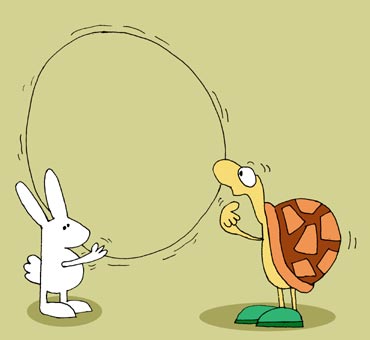 | « Back to article | Print this article |
7 common career mistakes young people make
Dr Uday Salunkhe, group director, Welingkar Institute of Management Development and Research, Mumbai lists the seven common mistakes young people make while deciding a career and suggests the way out. Illustrations: Uttam Ghosh/Dominic Xavier
1. Not taking enough time
Good decisions are made in a space of peace, where one has the time, space and solitude to look at different options; it makes a way for healthy choices.
Please remember that most of us confront the 'What do you want to be when you grow up?' question that may not be easy to answer. So, plan in advance and take enough time to answer it.
The first step in developing career goals is to assess your own personal characteristics--your skills and interests, your likes and dislikes, your strengths and weaknesses and match your "profile" to a specific job or career goal.
Career planning is a lifelong process; it does not begin with SSC/HSC exams and end with highly specialised postgraduate or PhD studies leading to a corporate placement.
Before choosing a career you may opt to work with a professional, or work through the process on your own, but either ways, it is the thought and energy you put into the process that will set you on the right path to success.
2. Failing to understand what is best for you
For most people figuring out their purpose in life and their dream career can be a simple and easier process while for others it may take a lifetime.
Setting goals and just believing in them do not always work for everyone, which is why it is important to know who you are and where you want to be in life before deciding on your dream career.
A teenager cannot be expected to know what he wants to do with the rest of his life. Our lives may take a sudden turn any time; this combined with changes in external ecosystem will bring changes in career goals from time to time.
While some of you may dream about becoming an innovator-par-excellence like Steve Jobs, a business leader like Indira Nooyi or a daredevil like Michael Schumacher, others want to be a teacher, nurse, journalist or even an entrepreneur. However, one must understand that this does not necessarily happen overnight.
So try to understand what works best for you, don't get swayed by predictions of industry trends, career counsellors, aptitude tests, parental expectations or peer pressure. It is good to take advice from people but don't let them dictate terms to you.
3. Neglecting your values
Too often we make decisions without giving a thought to our value system.
Today, many students enroll in B-schools not necessarily to aquire, apply and assimilate knowledge that will make them good global citizen managers in the true sense of the word but to avail of better placements.
A student must be sensitive enough to think innovatively and act ethically, irrespective of whether s/he is in a corporate career or kick starts a business of their own. S/he has the responsibility to care for society; the people and planet, and should not merely focus on personal profits.
The business exists because the society needs it. The licenses and resources given by the society may be taken back if not used diligently.
4. Ignoring what's right
Too many people make the mistake of deciding on a career path based on the anticipated salary level.
For example one may think of becoming a Doctor, Lawyer of a Chartered Accountant because of the perception of earning big bucks and making a good living, but in reality you may struggle with science, Law or Audits.
Choose your career based on the things you love to do, not the money that you think you may make.
"Do what you love and money will follow."
This advice has a grain of truth to it when it comes to choosing the right career.
If one is passionate about what he is doing, there is a good chance of becoming successful and also make money.
Surveys have shown that money doesn't necessarily lead to job satisfaction so don't ever ignore to define what is good for you.
5. Procrastinating
Sometimes making a decision is difficult, so we keep postponing it, but no decision is also a decision by itself.
Meanwhile, once the decision is taken about pursuing a certain career, set you objectives about finding the right institute which offers academic programs or courses that you want to enroll for.
You can make dramatic and measurable changes if you set crystal clear goals and chalk out a schedule to fulfill them. Most people wallow way too long in the state of "I don't know what to do."
You cannot wait for some external ecosystem to provide you with clarity as clarity is self-created.
Some of you may need to take a bank loan to study, some may even have family owned businesses that require your attention and time, or some other family pressure may create the compulsion for a course correction so be clear in setting your objectives and go ahead with achieving them without any delay.
6. Not looking for the right institute and academic programme
The most important thing to consider when choosing a career is the type of education or training required for the chosen programme.
A wise man once said, "Never let the lack of education stop you from doing what you want to do."
Just because your parents didn't go to college or because you don't have thousands of rupees lying around doesn't mean you should forget about taking admission in the institute and course of your choice.
If you want to do something passionately, there is always a way to get the financial aid you need to do the course whether you plan to pursue it in India or abroad.
7. Picking a course and a career is not the same thing
When students and parents talk about choosing a course, they often mean choosing a career (and vice versa).
Although these two choices can go hand-in-hand, choosing one does not automatically mean you have chosen the other. Some people assume that students who major in the arts, humanities, or social sciences are either not qualified for any jobs or qualified only for careers in those specific areas.
Actually, students with degrees in theatre, history, psychology, and similar majors find jobs in business, research, HR consultancies, teaching, army, event management or end up in production houses and a variety of other occupations.
A person who has taken a course in banking may actually be marketing financial services or for that matter someone who has studied Management may later be interested in Corporate Law and decide to develop his knowledge base and take it up as a career.
Today we are finding graduates from Harvard, Kelloggs setting up tea, coffee, pizza chains and those from leading hotel management institutes are getting into careers that involve exports, events, wedding planning and supply chains/logistics of offshore catering to name a few.






